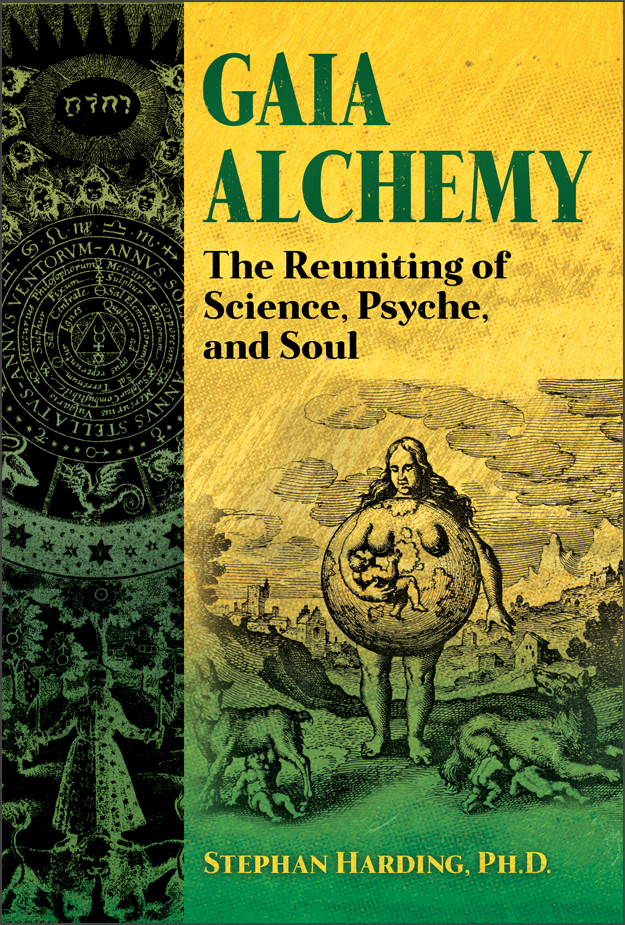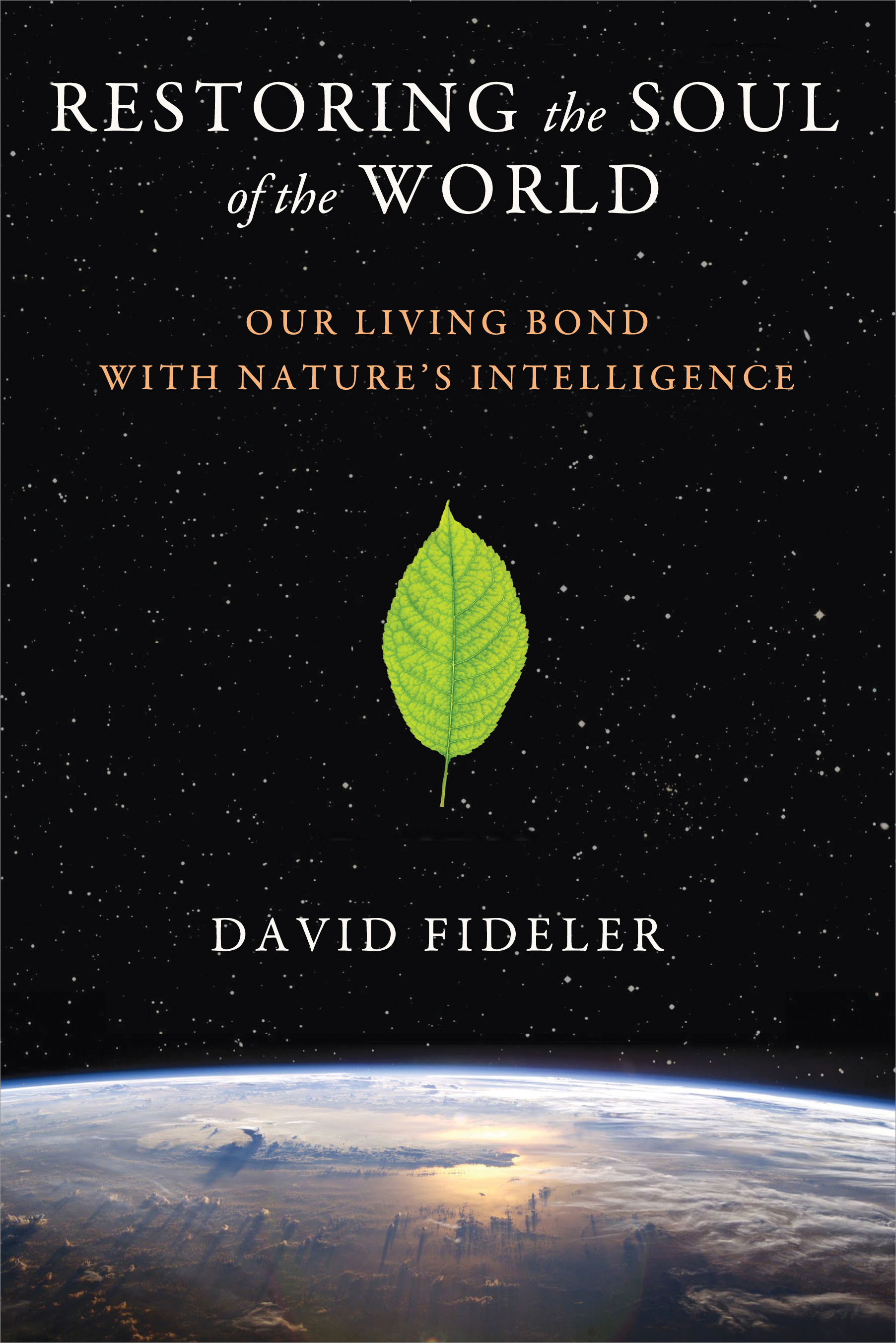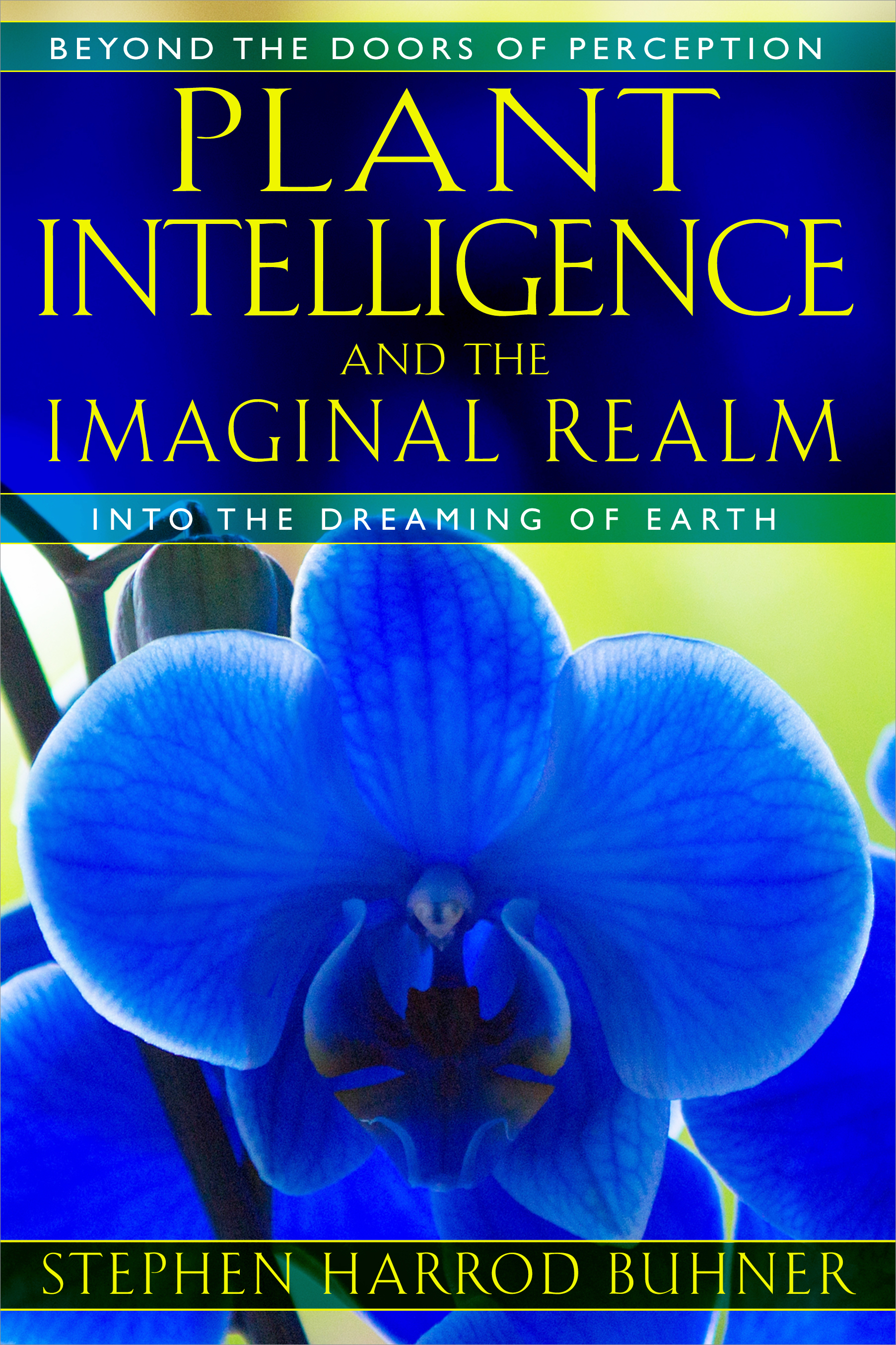Science Meets Alchemy
by Stephan Harding, Ph.D., author of Gaia Alchemy
I am a scientist—a scientific ecologist to be precise, but just as much drawn to music, art, philosophy, and the psychology of Carl Jung as the scientific ecology in which I was trained. The aim of my book, Gaia Alchemy, is to meld the ancient wisdom of alchemy with the modern science of Gaia theory.
Gaia theory is a scientific understanding of the Earth as a great planetary organism, as a self-regulating complex system; alchemy is the ancient art of personal transformation and nature connection. My quest has been to discover whether we can experience a Gaia that is more vibrant, full of meaning, and alive by alchemizing science, thereby re-ensouling science and our culture and thus freeing both from their analytical dryness.
I approached this quest by investigating what happens to our ecological awareness when we bring the science of Gaia deep into the realm of alchemical image and vice versa. I have found that uniting these opposites can help us develop a style of consciousness in which we experience ourselves as integral and responsible members of our planet’s vast swirling living body. I have found for myself that this union of science and alchemy leads us toward what I refer to as “Gaian consciousness” by deflecting our psychological life away from too much rationality and by plunging us into the deeply living qualities of nature, which we perceive with our feeling, sensing, and intuition. It seems to me and many others that without this kind of “Gaian consciousness” within each of us, it seems unlikely that our complex technological society will survive for very much longer.
If you like the sound of what I am proposing here with Gaia alchemy, then may treasures be revealed for you in the pages of my book. If not, then may the great beauty, inner light, and meaning of nature find you, heal you, and bless you upon some other golden pathway into your own unique wisdom. The alchemical quest is a completely individual one, a process entirely of our own that for me is a calling just as strong as that of being a zoologist and ecologist. If you feel similar callings, then perhaps my book could help you as my Gaian alchemical quest has helped me far beyond what I could have imagined when I began to tread this path.
Let me tell you a bit about my own highly individual journey toward what I sense as my own Philosopher’s Stone, which is to say my own hermaphroditic amalgam of Gaian science and alchemy. I did my first degree in zoology at Durham University and then, with the Animal Ecology Research Group at Oxford University, did my doctoral research on the behavioral ecology of the muntjac deer in southern England. After that I taught conservation biology and ecology at the National University in Costa Rica for nearly three years before spending three months exploring Buddhism while helping out in a Tibetan Buddhist monastery in Nepal. Then I spent another year at Oxford before becoming a founding faculty member at Schumacher College, Dartington, where I had been appointed (in 1990) as the college’s resident ecologist.
Schumacher College is part of the Dartington Hall Trust in south Devon, founded by Dorothy and Leonard Elmhirst in the 1920s as a rural location for radical experimentation with holistic living and learning inspired by two sages from India: Rabindranath Tagore in the 1920s and Satish Kumar since 1990. I am still on the faculty at Schumacher College and have been teaching and researching here for the last thirty years on the themes of Gaia theory, deep ecology, and holistic science.
Some three months after starting at Schumacher, I met James Ephraim Lovelock, the man who pioneered Gaia theory and who led the very first course at Schumacher College in January 1991. Thus, I first encountered the science of Gaia through its original innovator. I found it astonishing that such a small and (then) wholly unknown college could host such a highly distinguished scientist as its first principal teacher on the theme of Earth as a living organism. Lovelock and I hit it off immediately and thus began many visits to him and his wife Sandy in their home-cum-laboratory in the deep countryside of the Devon-Cornwall border during which we would explore Gaia through both science and philosophy. Through these visits, Lovelock and I became firm friends. I grew to know him simply as Jim.
In some way that I could not then fully discern, the image of Gaia held something powerful for which I had been searching during my career as a scientific ecologist: the promise of a deeper sense of wholeness, of a final integration of psyche and matter not just at the quantum level of invisible subatomic particles, atoms, and molecules with which we are vaguely familiar, but also at the ecological level of tangible beings such as rocks, atmosphere, water, and life. Decades later, I sense more and more that the image of Gaia has reappeared in our times to help us heal the tragic split between psyche and matter which is creating our contemporary global crisis. Perhaps we need, dare I say it, an ancient sacred global image to heal a contemporary secular global crisis.
I became part of a small group of scientists deeply inspired by Jim’s visionary, highly original systems-based understanding of our Earth as a vast, self-regulating planetary entity, thanks to the multifarious feedbacks between her living beings and her planet’s rocks, atmosphere, and water. We attempted to model this Gaian understanding mathematically on our whirring computers while Jim and I collaborated scientifically for a few years developing ecological extensions to his pioneering Daisyworld model, the first ever mathematical investigation of feedbacks between organisms (in this case, dark and light daisies) and their physical environment: namely, the surface temperature of their planet. Daisyworld has interesting alchemical implications which I also explore in my book.
Another firm friend in Gaia for me was Lynn Margulis, the great American evolutionary biologist who was Jim’s earliest collaborator in presenting his Gaia hypothesis to the scientific community. Margulis brought the details of microbial metabolism and ecology into the Gaia hypothesis, showing how bacteria and other microbes greatly modify the waters, rocks, and atmosphere of our planet. She was also a great pioneer and champion of symbiosis rather than of random gene mutation (as in Neo-Darwinism) as the great source of innovation in the evolutionary history of our planet. Despite immense opposition, she championed what once thought improbable but is now accepted as solid science: that mitochondria (those little organelles that produce energy inside cells with nuclei) and chloroplasts (the photosynthetic organelles inside plant and algal cells) are descended from once free living bacteria engulfed by their larger host bacteria thousands of millions of years ago.
Lynn Margulis was the best biology teacher I have ever had. She was brilliantly holistic, deeply dedicated to her science, and immensely passionate about symbiosis as the primary force in the evolution of life. Like Jim, she too taught at Schumacher College with me on several occasions, delighting and informing us with her rich knowledge of the microbial world with which she was so enamored. I am deeply grateful to them both, for thanks to them Gaia continues to blow my socks off.
Sometimes I shake with astonishment at the enormous significance of Gaia’s reappearance in our culture as a powerful image of the sacred Earth. At other times the science of Gaia amazes me: planet cooling clouds seeded by trees; bacteria in clouds deciding when it rains; tiny marine algae in the surface ocean cooling the planet by seeding clouds and precipitating chalk; fungal tubes linked to roots in the soil transferring food and information among members of the plant community . . . and that’s just the start.
Another very important person for me in my quest to write this book on Gaia alchemy is Jeffrey Kiehl. Jeffrey has a Ph.D. in atmospheric science and until recently was head of the Climate Change Research Section in the National Center for Atmospheric Research in Boulder, Colorado. We met online over supervising the master’s thesis of one of our students. As well as being a senior climate scientist with many peer-reviewed papers published in several key areas of climate science, Jeffrey is also a highly respected and seasoned Jungian analyst with a strong interest in alchemy. So, as well as being a first-class scientist versed in Gaia theory, ecology, and quantum physics, Jeffrey has deep insights into alchemy’s hidden meanings and knows the relevant literature extremely well.
Strangely enough, for some time before we met, Jeffrey had been developing ideas and delivering teaching sessions on what he calls alchemical ecology, which explores very similar terrain to Gaia alchemy by using alchemy to reenvision the science of ecology and the dynamics of ecosystems. It astonished us both to discover that an almost identical inspiration had occurred to each of us independently long before we knew each other. Our sense is that we received these insights from transpersonal realms of psyche, an inspiration which commits us to exploring alchemical ecology and Gaia alchemy together to help wake us up to the wonder and meaning of our living planet and all her beings in this time of crisis.
The common thread between the companions in my quest whom I have introduced to you here is that all of us are scientists who have sensed that our planet is in some way a great self-regulating being, perhaps even alive in the way a living organism is. I am grateful to science for what it has taught us factually about the world, but I have also come to realize that science on its own will not help us make the world a better place, for science develops our thinking to a huge extent but does not deliberately and systematically develop our feelings of love for the whole of nature. The result of this is that we are unable to perceive the immense value and importance of Gaia and all her beings. All this because we scientists have not been educated from early on how to cultivate, refine, and listen to those feelings of love and valuing as part and parcel of our practice of science.
Science has made us immensely clever but has not made us wise. It is wisdom we need now in this time of severe global ecological crisis. We need a new kind of science that values wisdom a little bit more than cleverness. We must become “Gaia-wise” in these very difficult times by putting wisdom and science together. This is what we at Schumacher College call holistic science.
But what is wisdom? A wise person knows how to think, how to value, how to sense, and how to evoke intuitive insights and knows when and how to bring these modalities compassionately to the fore in any given situation. Such a person also pays attention to dreams, knows how to enter deep meditative states, and feels the thrum of living nature in their heart. Obtaining this kind of consciousness may seem almost impossible today. However, by simply intending to do this, somehow it happens more and more.
Wisdom springs from ancient regions of psyche, from our most earthy, down-to-earth feeling for the things and beings around us. Science, quite rightly, seeks new models, new concepts, new ideas, and new experiments. In contrast, wisdom flourishes when we make contact with ways of seeing and understanding that have been with us since the very first glimmerings of human consciousness in humanity’s early days of hunting and gathering, when we first wondered at the majesty of the stars and at the immense profusion of living beings around us.
Alchemy is a pathway to wisdom. Alchemy opens up channels into valuing, sensing, intuiting, and thinking that we never knew we had. It makes us more whole, more alive, more earthy. Furthermore, it helps us to realize that thinking is just one of our four major ways of knowing and encourages us to cultivate the poor relation in our personality—the way of knowing we like least and which makes us feel most uncomfortable. Often, for scientists and other thinking types, this “inferior function” (as Jung called it) is feeling. By feeling, I mean our ability to perceive the value of things not with our heads but with our hearts, which are of course connected with love. We need much more of this way of feeling and perceiving the immense of value of nature to help us through these troubled times.
In my book, in addition to looking at Jung’s ideas, I also follow the advice of one of the heirs to Jung’s work, James Hillman, by being very careful with language. As Hillman says in his book Alchemical Psychology, the ways we speak and write reveal our collective cultural biases, showing us which life-giving forces we fail to actualize and experience in our everyday lives. Without us even noticing it, our Western languages plunge us into a particularly over-analytical bent of mind that leads us to destroy our planetary ecology by turning the world into an “out-there” of dead “things.”
This severe one-sidedness is, as Hillman indicates, a cultural neurosis. Hillman’s cure for the neurosis of our language is to transform our over-rational way of speaking into an alchemical relationship with the world. We must heal fast before our time runs out as we find ourselves running for cover in the climate emergency, as many already are being forced to do in various parts of the world. Even here in sedate England, many recent unprecedented flooding events have demonstrated the urgency of our situation.
Hillman writes: “Every alchemical phenomenon is both material and psychological at the same time, else alchemy could not claim to be salvific of both the human soul and material nature.” This is quite a claim. If the world is indeed one seamless psyche, what happens alchemically within us must somehow also happen in the wider world of ecology and nature. Otherwise, we fall into the split of Cartesian dualism, believing that psyche exists only in us but not in the world itself. If we manage to experience a Gaian alchemical conjunction, will the world spring to life so much that a spontaneous feeling arises in us to love and protect our wider body, our animate earth? If so, then the alchemical process is after all very down to earth: very practical, very pragmatic, and very much needed.
Science and alchemy: both are ways of knowing that are part of us; part of our brain and body structure; part of our human psyche. Both are needed for our wholeness and our planet’s. Every one of us, scientists included, has a psyche that takes part in the much wider psyche of nature, which is why it is so important to investigate the connections between Gaian science and alchemy. It’s time to discover a new, contemporary Gaian consciousness by bringing these two aspects of ourselves, science and psyche, together after the tragic 400-year separation inflicted upon us by the scientific revolution. Let the healing begin.
 |
 |
 |
 |
 |



